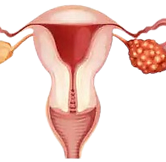Ovarian Cancer
Home > Ovarian Cancer

Epithelial ovarian cancer: is the most frequent type of ovarian cancer, accounting for 85% to 89% of cases. The epithelial cells on the ovary’s surface are where it develops.
Germ cell ovarian cancer: It makes up just around 5% of cases of ovarian cancer, making it a rare kind. The cells that make the eggs in the ovaries are where germ cell cancers begin. This cancer typically affects just one ovary and is most prevalent in adolescent girls and young women.
Stromal cell ovarian cancer: begins in the tissues that hold the ovarian tissues together and make female hormones. 10% of ovarian cancers and 5- 10% of breast cancers are caused by the often hereditary disorder known as familial breast-ovarian cancer syndrome. Study shows a connection between ovarian and breast cancer. Each woman who has experienced one of these cancers is more likely to experience the other.
Causes:
- Age: Ovarian cancer is more common in women over the age of 50.
- Family history: Women who have a close relative (such as a mother, sister, or daughter) with ovarian cancer have an increased risk of developing the disease.
- Inherited gene mutations: Women who inherit certain gene mutations, such as BRCA1 and BRCA2, have an increased risk of ovarian cancer.
- Hormone replacement therapy: Some studies have suggested that long-term use of hormone replacement therapy (HRT) may increase the risk of ovarian cancer.
- Obesity: Being overweight or obese may increase the risk of ovarian cancer.
Symptoms:
- Abdominal bloating or swelling
- Difficulty eating or feeling full quickly
- Pelvic or abdominal pain
- Frequent or urgent urination
- Fatigue
- Back pain
- Indigestion or heartburn
- Constipation
Diagnosis:
- Physical examination: The doctor will examine the pelvis and abdomen for any lumps or masses.
- Imaging tests: Ultrasound, CT scan, MRI or PET scan can help detect the presence of ovarian tumors.
- Blood tests: Blood tests such as CA-125 and HE4 can detect the levels of tumor markers in the blood. These markers may be elevated in women with ovarian cancer.
- Biopsy: In a biopsy, a small sample of tissue is taken from the ovary and examined under a microscope for the presence of cancer cells.
Treatment:
Prevention::
- Birth control pills: Using birth control pills can reduce the risk of ovarian cancer.
- Pregnancy and breastfeeding: Women who have had children and breastfed have a lower risk of ovarian cancer.
- Removal of ovaries: Women who have a high risk of ovarian cancer, such as those with a family history of the disease, may choose to have their ovaries removed as a preventive measure.
- Healthy lifestyle: Maintaining a healthy lifestyle by eating a balanced diet, exercising regularly, and avoiding tobacco and excessive alcohol consumption can also reduce the risk of ovarian cancer.
